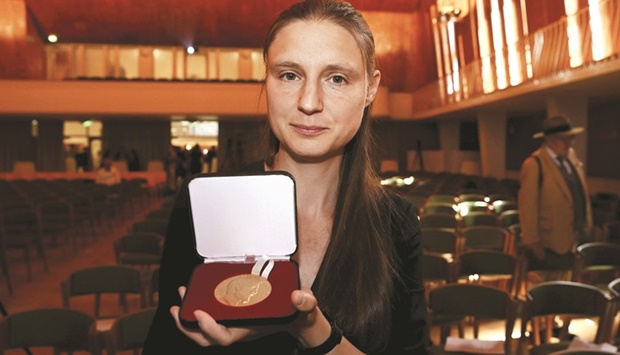Ukraine’s Maryna Viazovska paid tribute to those suffering in her war-torn country yesterday when she became the second woman to be awarded the Fields Medal, known as the Nobel prize for mathematics.
Viazovska, a 37-year-old maths professor, received the prestigious award alongside three other winners at a ceremony in Helsinki. “I am from Kyiv, Ukraine, and in February my life changed forever” when Moscow invaded, she said in a video displayed at the ceremony.
“Not only for me but for everyone in the world and especially the people in my country,” she said, adding that her two sisters had been evacuated from Kyiv.
“Right now, Ukrainians are really paying the highest price for our beliefs and our freedom.”
The International Congress of mathematicians, the event where the prize is awarded, was initially scheduled to be held in Russia’s second city, Saint Petersburg, and opened by President Vladimir Putin.
Earlier in the year hundreds of mathematicians signed an open letter protesting at the choice of the host city, and after Moscow invaded Ukraine the event was moved to the Finnish capital. The other Fields winners were France’s Hugo Duminil-Copin of the University of Geneva, Britain’s James Maynard of Oxford University and June Huh of Princeton in the United States. The medal, along with $15,000 Canadian dollars (US$11,600), is awarded every four years to between two to four candidates under the age of 40 for “outstanding mathematical achievement”.
Viazovska was born in 1984 in Ukraine and has been chair of number theory at the Ecole Polytechnique Federale de Lausanne since 2018. At the ceremony she paid tribute to Yulia Zdanovska, a young mathematician who was killed by a Russian missile attack on the Ukrainian city of Kharkiv in March. “Her dream was to raise this new generation of scientist, doctors, teachers,” Viazovska told AFP.
“The fact that these dreams will not be realised, it’s terrible. We could just think of what kind of great future we could have had and what the war is robbing us of.”
She felt “very sad and angry” and “feels a lot of pain every time I read the news”, she added.
In a decision made before the war in Ukraine began, Viazovska was awarded the Fields Medal for her work in sphere packing — a problem posed by German astronomer and mathematician Johannes Kepler nearly 400 years ago.
He proposed that the most compact way to pack spheres was in a pyramid, like oranges at a supermarket.
It was such a complex problem that it was not considered proved correct in the third dimension until 1998 via intense computer number-crunching.

Maryna Viazovska poses with her medal during the prize ceremony at the International Congress of Mathematicians 2022 in Helsinki yesterday. (Reuters)
